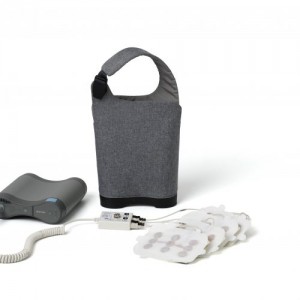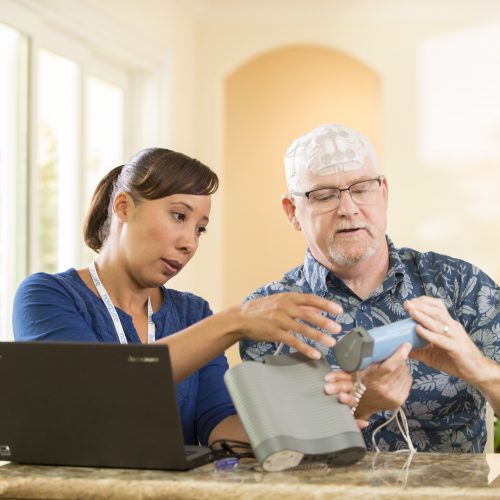Neurosurgeons at Michigan Head and Spine Institute have begun using Optune for the treatment of newly diagnosed and recurrent glioblastoma (GBM). Richard Veyna, M.D., is certified to prescribe this wearable and portable medical device, the first FDA-approved therapy in more than a decade for newly diagnosed GBM.
“Our goal at Michigan Head & Spine Institute is to treat cancer patients with the latest, approved therapies available, so we welcome the opportunity to provide Optune as part of a combination treatment for those fighting GBM,” said Richard Veyna, M.D. “We want our patients to have the best possible quality of life. With Optune as a therapy patients are able to go about their daily activities with minimal disruption to their lives.”
For newly diagnosed patients, Optune is used with the chemotherapy temozolomide (TMZ) after surgery and radiation with TMZ. In a clinical trial, adding Optune to TMZ was proven to delay GBM tumor growth and extend survival in newly diagnosed patients compared with TMZ alone. For recurrent patients, it can be used alone when surgery and radiation treatment options have been exhausted. Optune is approved for the treatment of adult patients (22 years of age or older) with GBM. In a clinical trial, adding Optune to TMZ provided an unprecedented five-year survival advantage in patients with newly diagnosed GBM.
About Glioblastoma Multiforme
Glioblastoma, also called glioblastoma multiforme, or GBM, is the most aggressive type of primary brain tumor. While GBM is rare, it is the most common type of primary brain cancer in adults. Approximately 12,500 new cases of GBM or brain tumors that may progress to GBM are diagnosed in the United States each year. (Watch Pamela’s story)
How Optune Works
Optune creates low-intensity electric fields—called Tumor Treating Fields (TTFields)—which potentially slow or stop cell division leading to cancer cell death. Because TTFields do not enter the bloodstream like a drug, they did not significantly increase TMZ-related side effects for newly diagnosed patients. In clinical trials the most common device related adverse events were scalp irritation from device use and headache.
For the treatment of recurrent GBM, Optune is indicated following histologically–or radiologically–confirmed recurrence in the supratentorial region of the brain after receiving chemotherapy. The device is intended to be used as a monotherapy, and is intended as an alternative to standard medical therapy for GBM after surgical and radiation options have been exhausted.
Guidelines for Use of Optune
Optune should not be used if the patient has an active implanted medical device, a skull defect (such as, missing bone with no replacement), or bullet fragments. Use of Optune with implanted electronic devices has not been tested and may theoretically lead to malfunctioning of the implanted device.
Use of Optune together with skull defects or bullet fragments has not been tested and may possibly lead to tissue damage or render Optune ineffective. Do not use Optune if you are known to be sensitive to conductive hydrogels. In this case, skin contact with the gel used with Optune may commonly cause increased redness and itching, and rarely may even lead to severe allergic reactions such as shock and respiratory failure.
Warnings and Precautions
Optune should only be used after receiving training from qualified personnel, such as your doctor, a nurse, or other medical personnel who have completed a training course given by Novocure™ (the device manufacturer).
Optune should not be used if the patient is pregnant, or thinks she might be pregnant or are trying to get pregnant. It is not known if Optune is safe or effective in these populations.
The most common (≥10%) adverse events involving Optune, in combination with temozolomide, were low blood platelet count, nausea, constipation, vomiting, fatigue, scalp irritation from device use, headache, convulsions, and depression.
The most common (≥10%) adverse events seen when using Optune alone were scalp irritation from device use and headache.
Scalp irritation from device use, headache, malaise, muscle twitching, fall and skin ulcer is considered an adverse reaction related to Optune when using the device alone.
Cautions:
All servicing procedures must be performed by qualified and trained personnel, like Dr. Veyna.
Do not use any parts that do not come with the Optune Treatment Kit, or that were not sent to you by the device manufacturer or given to you by your doctor.
Do not wet the device or transducer arrays.
If you have an underlying serious skin condition on the scalp, discuss with your doctor whether this may prevent or temporarily interfere with Optune treatment.
